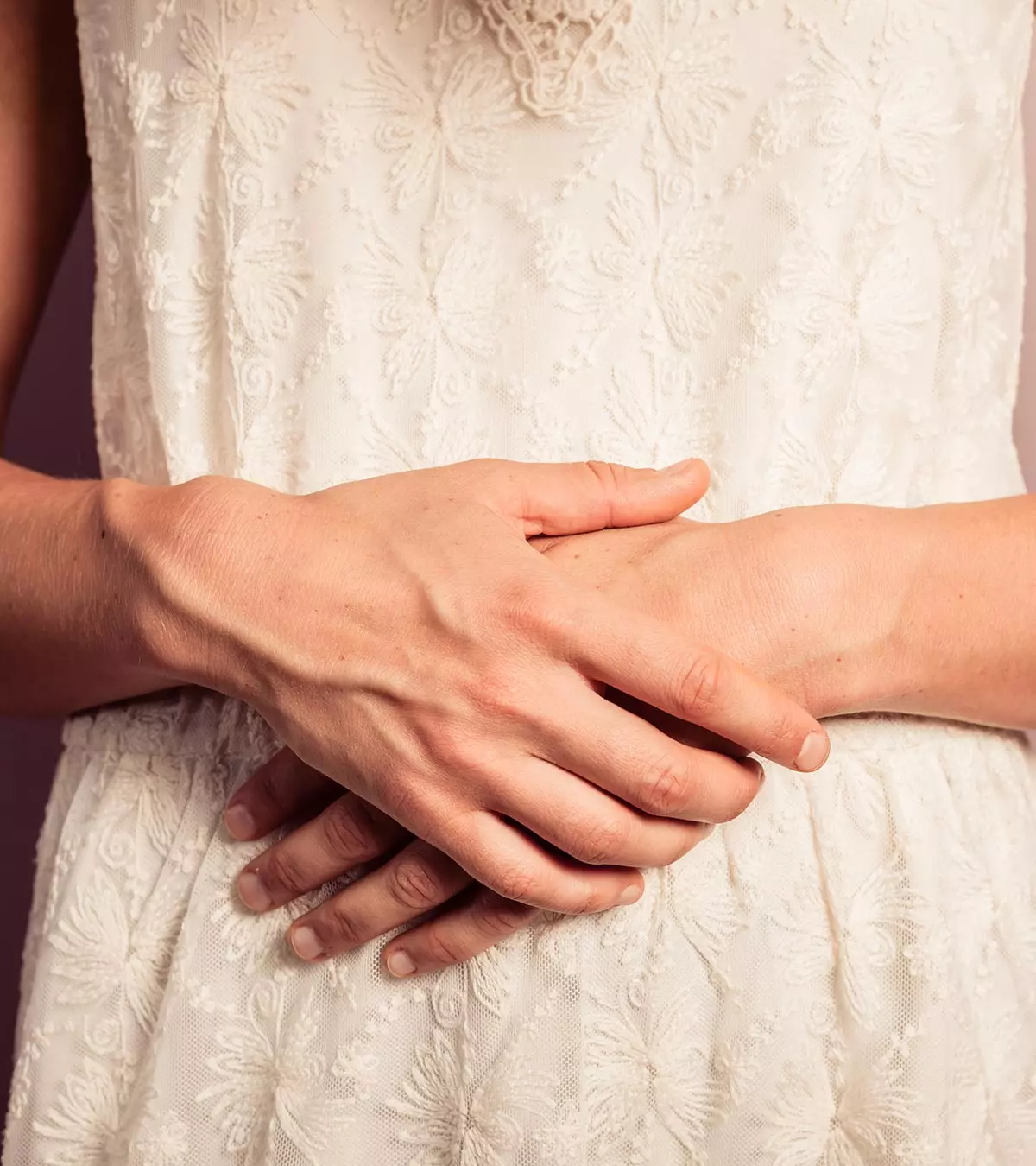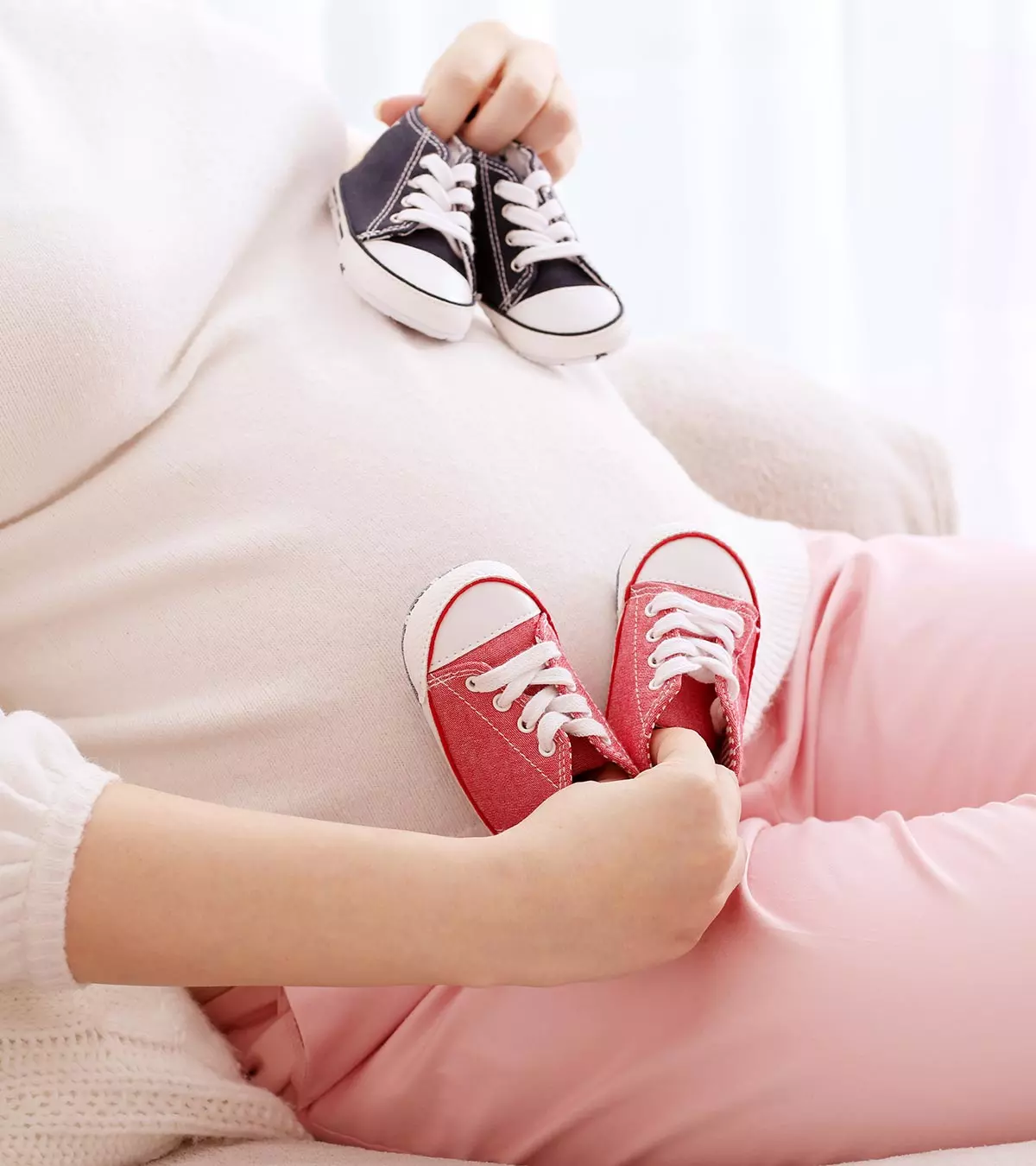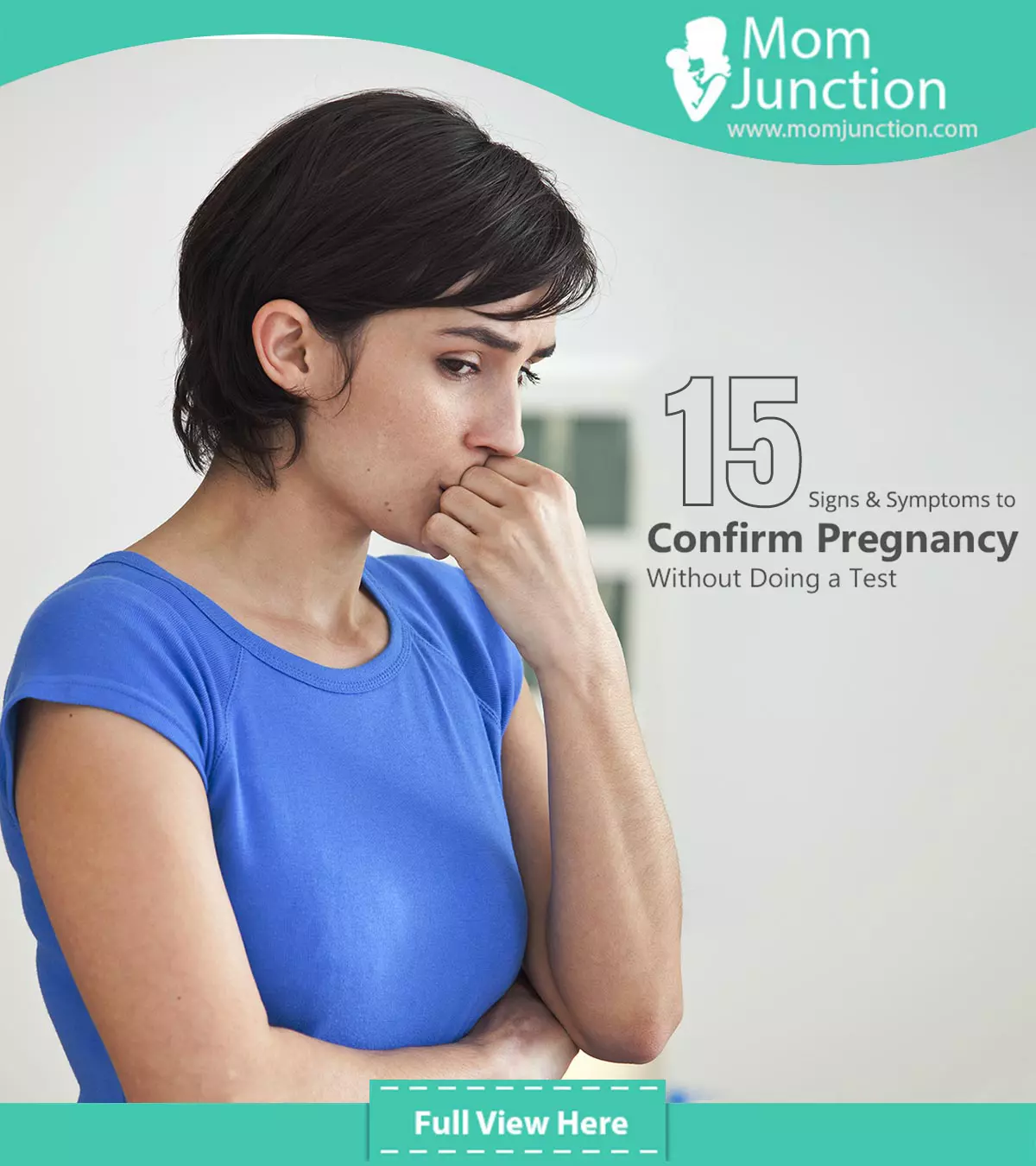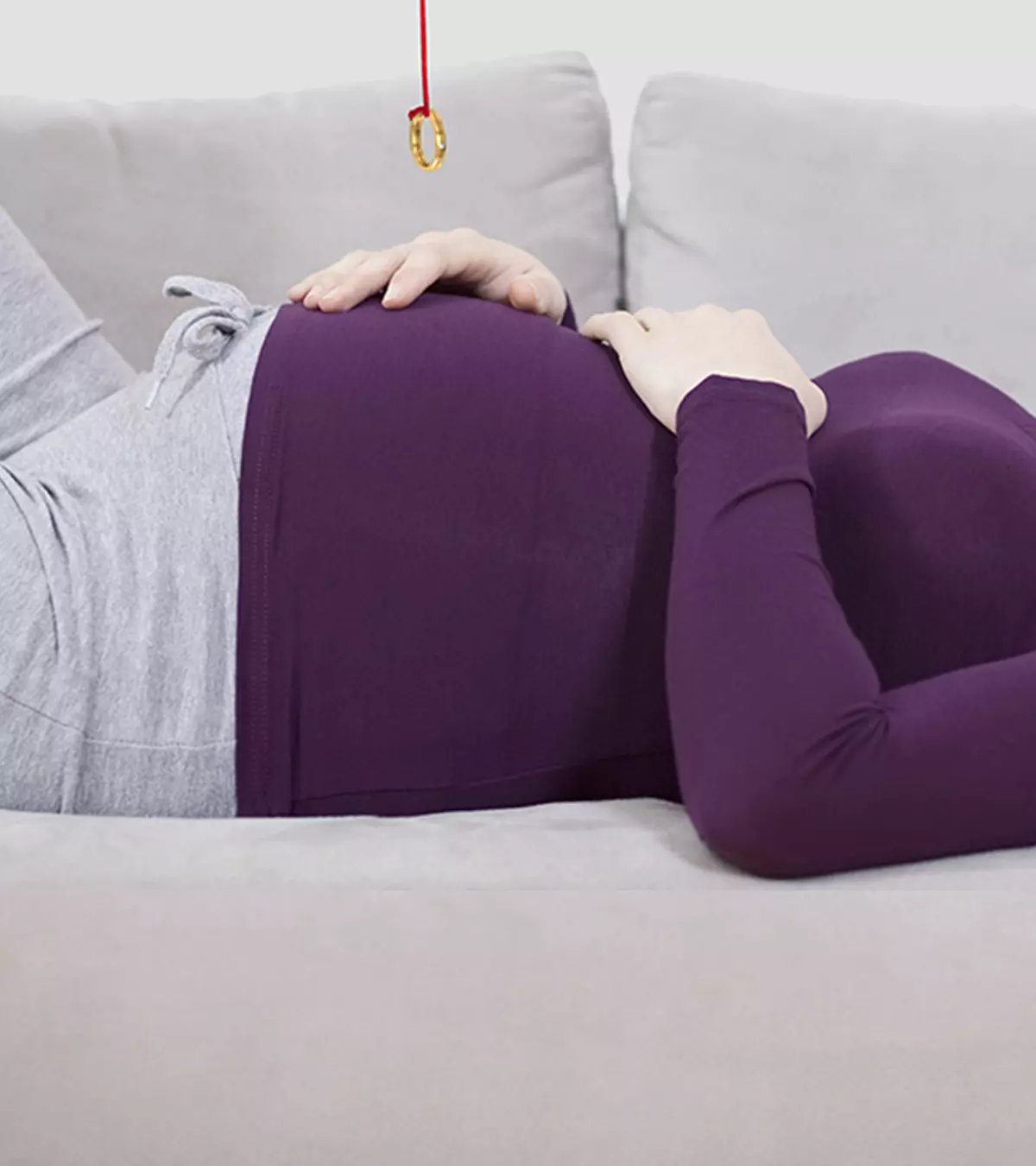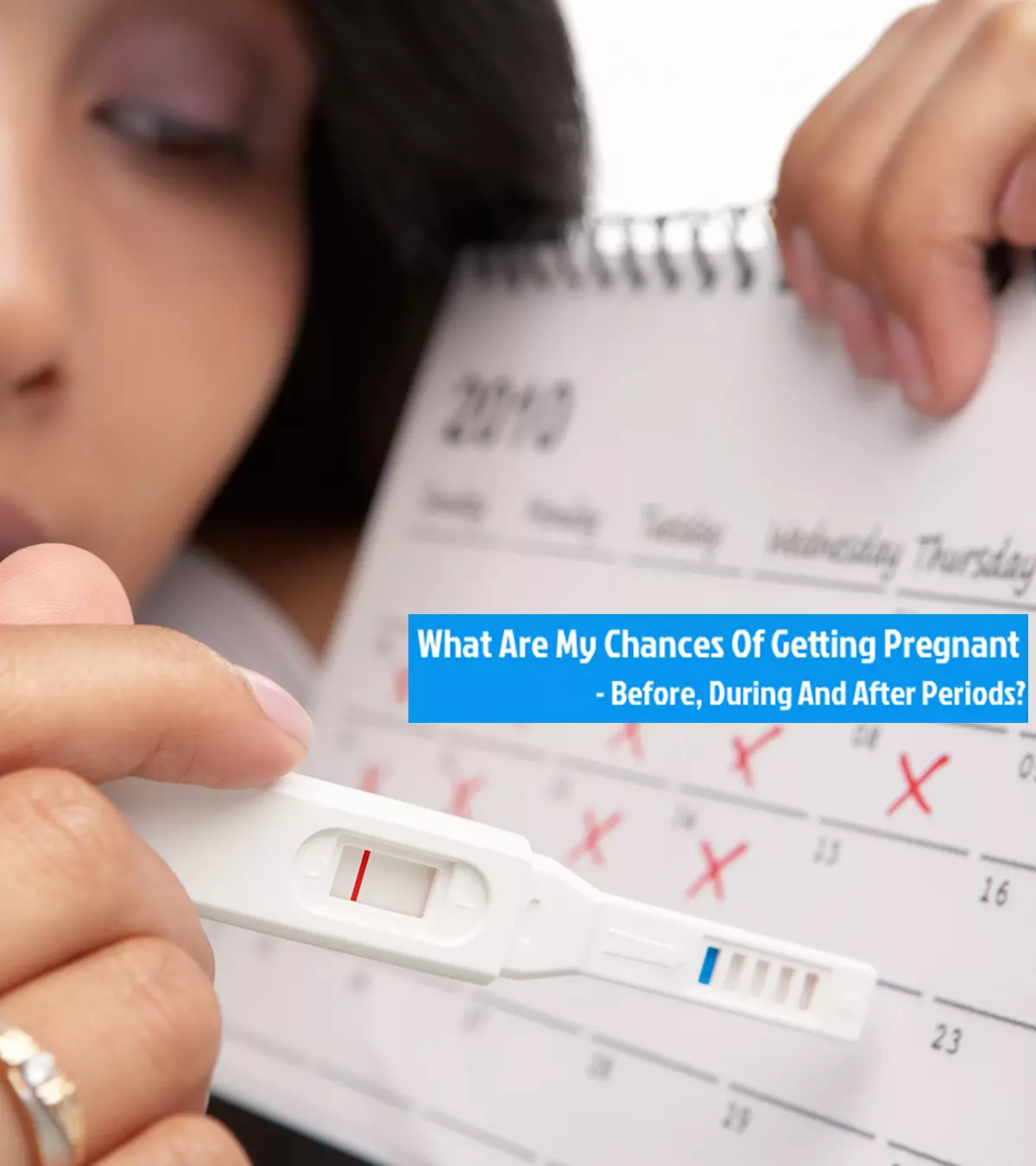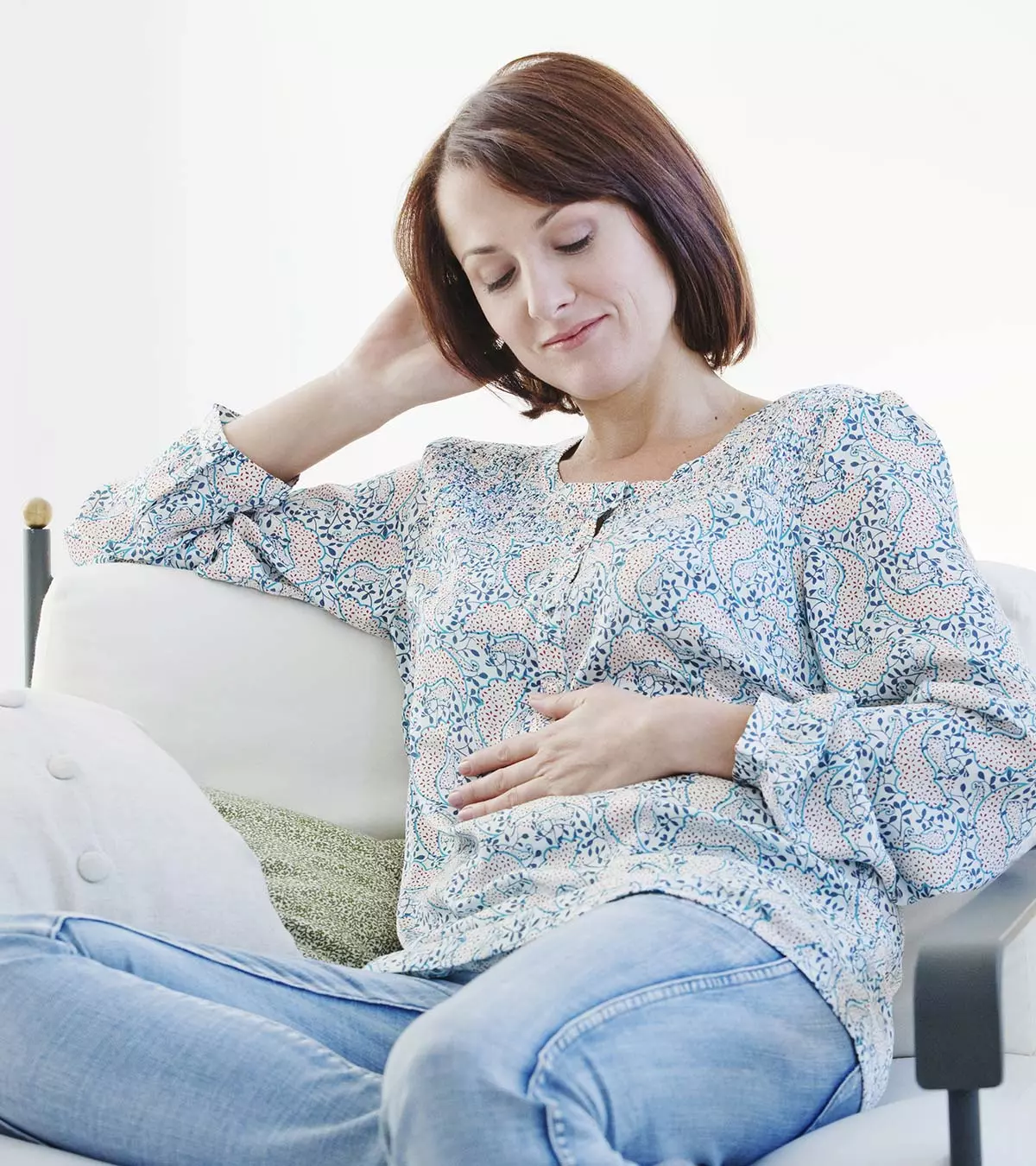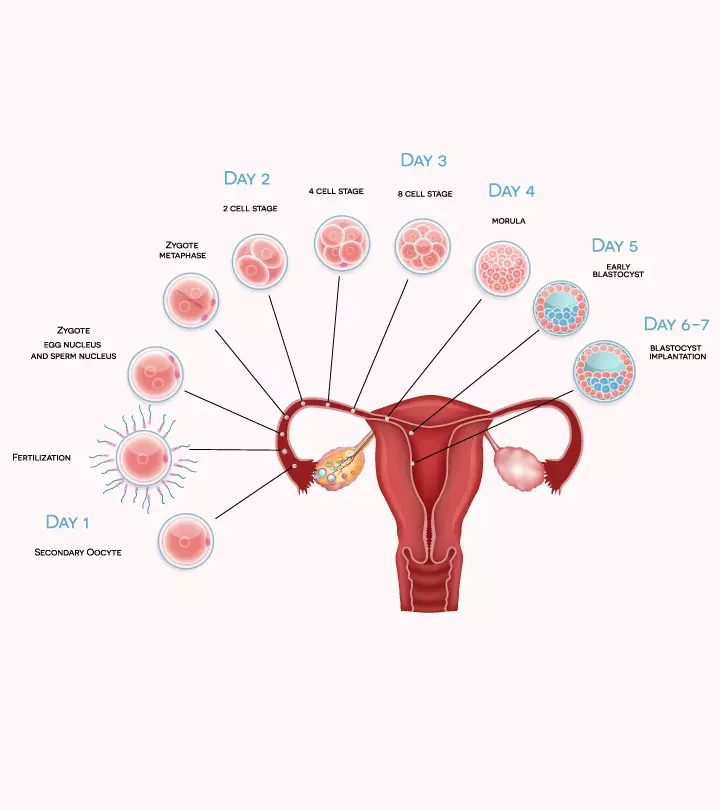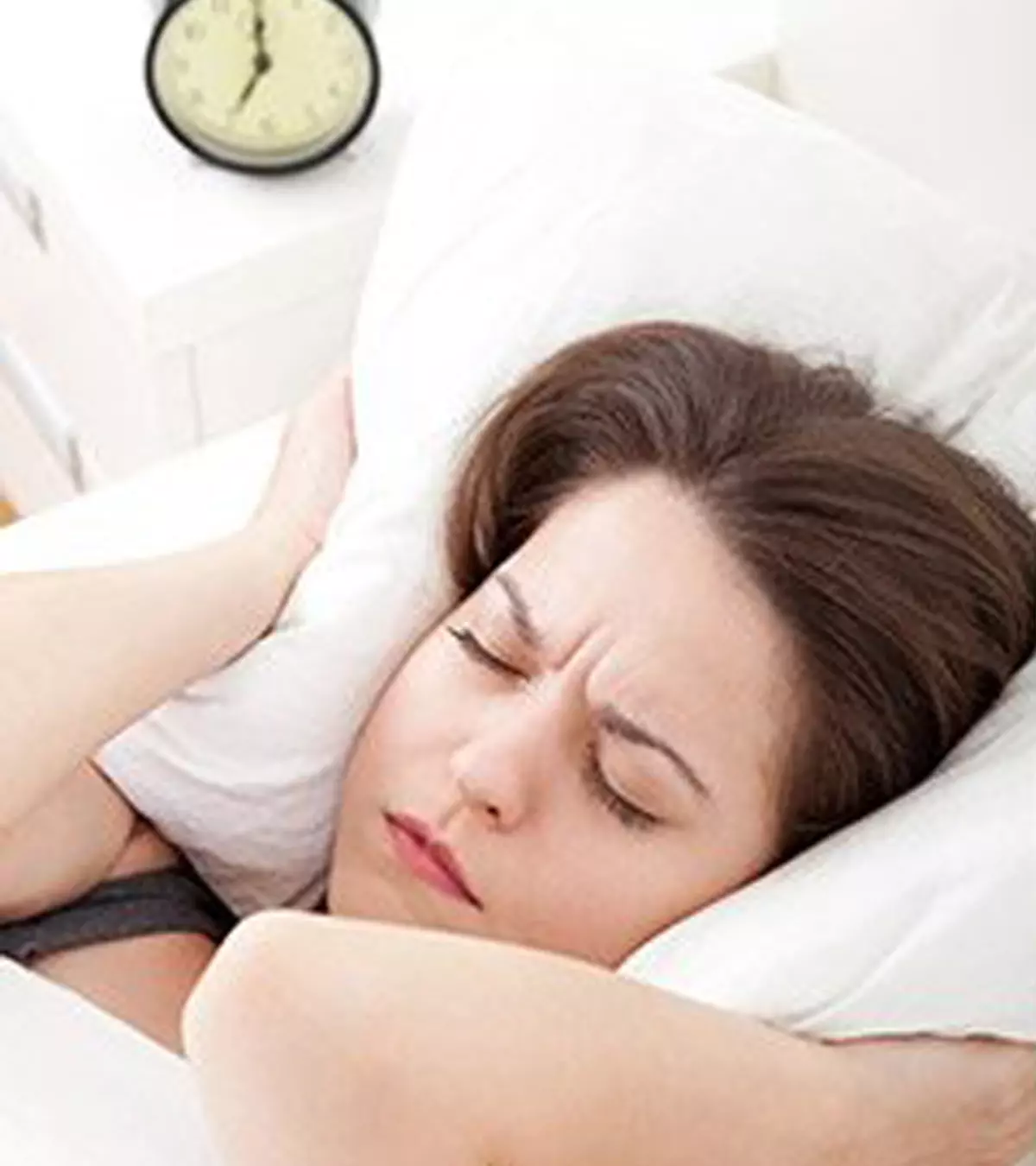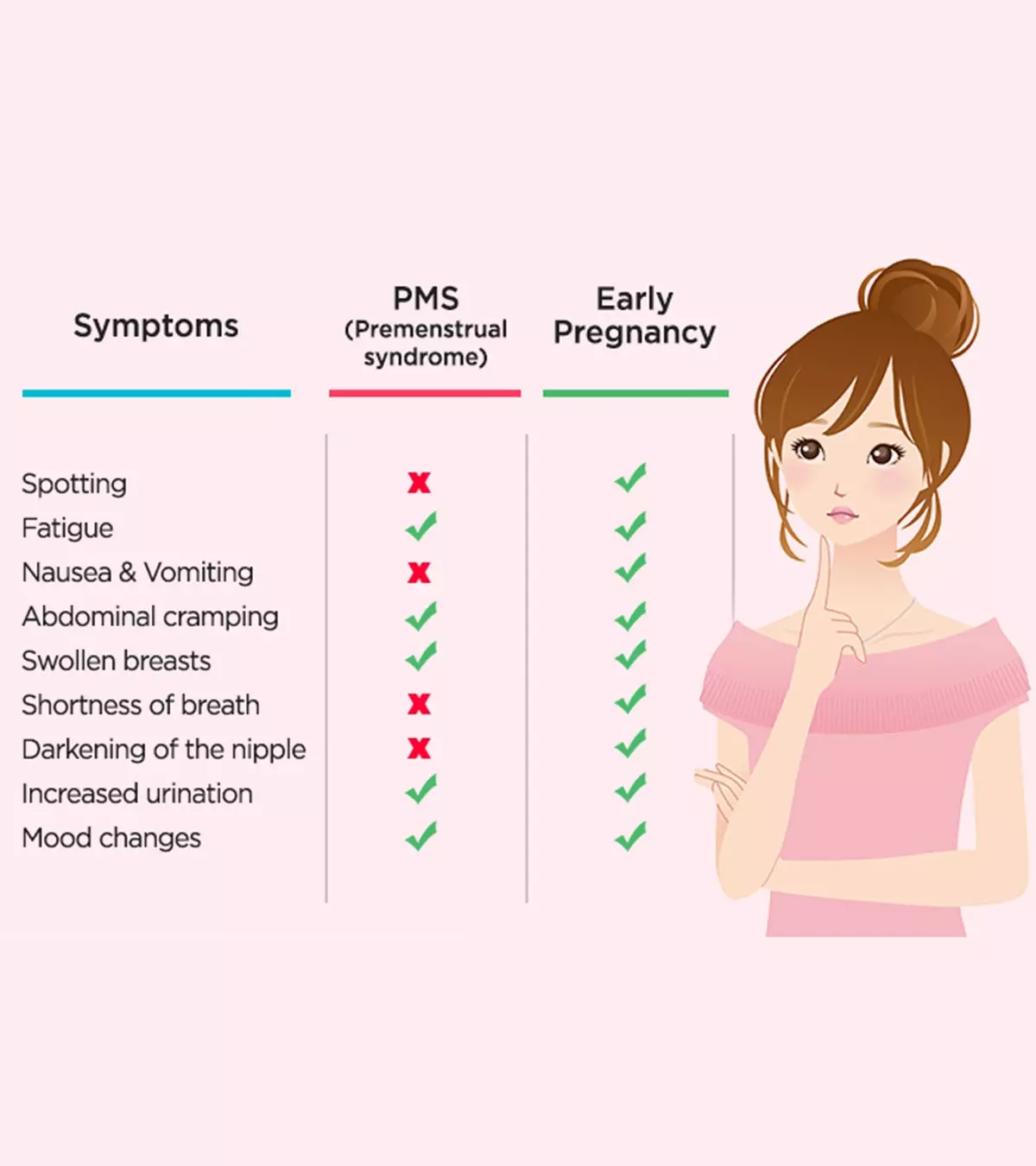
Image: ShutterStock
Most women may have heard about premenstrual syndrome (PMS) but wonder about its difference from pregnancy symptoms, leading to the PMS symptoms vs. pregnancy symptoms curiosity. Premenstrual syndrome (PMS) may present as a group of symptoms affecting your physical, psychological, emotional, and mood status experienced by some women during the period between ovulation and the start of menstrual flow. The symptoms of PMS vs. pregnancy may be difficult to distinguish and may cause you to be confused. PMS symptoms last about five to eleven days and usually disappear at the onset of your period (1). Identifying the differences between pregnancy signs and PMS can help reduce anxiety and support informed health choices.

Key Pointers
- Premenstrual symptoms can affect a woman’s emotional, physical, and psychological wellness, and typically last between 5-11 days before the start of the menstrual period.
- Bleeding, cramps, abdominal pain, and fatigue are common symptoms that vary in frequency and intensity with PMS and pregnancy.
- Back pain, headache, constipation, tender breasts, mood swings, and frequent urination are some common symptoms of both pregnancy and PMS.
- Unique pregnancy symptoms include elevated basal body temperature, darkening of the nipple, and changes in the consistency of cervical mucus.
- It is ideal to consult a doctor when experiencing any unusual symptoms during the menstrual cycle or pregnancy.
PMS Symptoms Vs. Pregnancy Symptoms
Samantha Lynn, a mother from Alaska, explains how distinguishing between PMS and early pregnancy symptoms helped her. She says, “Being familiar with my typical PMS symptoms helped me a lot. If you’re actively trying to conceive and wonder if the symptoms you’re experiencing are related to PMS or early pregnancy, maintaining a symptom journal based on your usual monthly experiences is a valuable strategy. By comparing these entries to your symptoms from previous months, you can identify any unusual changes and consider the possibility of pregnancy (i).”
Let us first understand the differences between PMS and pregnancy symptoms, and then the symptoms common to both.
1. Bleeding
PMS: You may not have any bleeding or spotting until your period starts. Once the period starts, you might have heavier bleeding that could last for a week.
Pregnancy: You might see light spotting (pink or dark brown) at the time of implantation (which happens 6 to 12 days after conception) when the embryo attaches itself to the uterus (2). It may last for a couple of days and is shorter than a menstrual period.
According to Dr. Kirti Patel, a board-certified gynecologist from Greater Boston, Massachusetts, “Most people do not notice implantation, however some report cramping, a light bleeding, or spotting. Thereafter, if implantation does occur, hormone levels will increase and symptoms of pregnancy can start to develop. When in doubt about whether you’re having PMS symptoms or early pregnancy symptoms, I suggest a pregnancy test.”
2. Fatigue
PMS: You may feel exhausted even if you have not done anything strenuous, and it goes away when your periods are round the corner (3). You may deal with your fatigue by practicing some exercises that could improve your sleep.
Pregnancy: If your periods are delayed, and you are experiencing extreme fatigue, it can be a symptom of pregnancy. It may last throughout the pregnancy due to the surge in progesterone levels that causes a drop in blood pressure and sugar levels. Good nutrition, deep breathing exercises, short naps, and drinking enough water during the day might help (4).
 Quick fact
Quick fact3. Food cravings/aversions
PMS: Your eating habits are likely to change when you have PMS. You may crave sweets, chocolates, carbohydrates, or salty foods, and you will develop a ravenous appetite. Although you crave some food (5), you can easily resist the cravings and temptations.
Pregnancy: You may experience food cravings during pregnancy, an increased appetite for some foods, and aversions for others. Some women also suffer from a food eating condition – pica – where they feel like eating non-food items such as dried paint flakes, metal pieces, and ice. In this case, you should consult your doctor immediately (6). These signs do not show in a PMS.
Dymund Dina, a mother, shares how she developed a craving for clay during her pregnancy. She says, “When I fell pregnant, for some reason I just had a crave for it and initially, I didn’t know it was a craving for clay because what I was craving was like just that earthy smell, that fresh smell of rain that you get. That is really what drew me to it. Then, I tried clay, and I first tried it when I was pregnant (ii).
4. Nausea and vomiting
PMS: Many girls experience nausea or vomiting just before or during their periods. This is likely caused by hormonal changes, and the symptoms typically subside within a day or two (7).
Pregnancy: Most women feel nauseous during early pregnancy. If your periods are delayed, and you are extremely nauseous, you may be pregnant. Nausea begins any time after two to eight weeks post-conception and continues throughout pregnancy. It is known as ‘morning sickness’ that may occur at any time of the day (8).
5. Abdominal or pelvic cramping
PMS: Cramps or dysmenorrhea during PMS is common, and the severity varies according to genetic disposition and body system. However, as bleeding starts, the pain and bloating decrease and slowly disappear as the flow ends (9). The abdominal cramps and associated pain will likely reduce with age (10).
Pregnancy: When the fertilized egg embeds into the uterine wall, it may cause mild abdominal cramping along with spotting during early pregnancy. You may experience cramps in the lower back or lower stomach, which continues for weeks or even months, lasting much longer than PMS cramps (11).
Similarities Between PMS And Pregnancy
If you have the signs listed next, it may be difficult to say whether it is an upcoming period, or you are pregnant (5) (12).
- Back pain: You may experience back pain when your period is nearing, and also when you are pregnant.
- Headaches: Headaches and migraines are common both during pregnancy and before periods.
- Constipation: The progesterone hormone leads to digestive issues such as constipation. As these levels rise during the second half of the menstrual cycle, it affects women experiencing PMS too. Also, hormonal changes early in pregnancy could cause constipation (13).
- Tender and swollen breasts: You might experience sore breasts, pain, swelling, tenderness, heaviness, sensitivity, and enlargement before your period and in early pregnancy (14).
Lynn shares that 15 days post ovulation, “My breasts were still very sore. That lasted for a really long time. They’re still sore now (at 20 weeks pregnant), but not as bad as they were in the first trimester.”
- Increased urination: You are likely to experience frequent urination when you are about to have your period and in your early pregnancy (15).
- Mood changes: Irritability, depression, anxiety, crying spells, and mood swings are all normal before your periods (16) and in pregnancy (16). According to a study published in the Journal of Psychiatric Research, it was found that mood remained generally stable throughout the study period (17). However, there was an initial decrease in positivity and an increase in irritation across all samples and subsamples during the first trimester. Among participants in the long-term observation group, positivity increased and irritability decreased during middle pregnancy, but slightly reversed again in late pregnancy. According to a study, about 20% of pregnant women worldwide experience depression during pregnancy (18).
These symptoms might make you anxious when you are hoping to have a baby or miss taking a contraceptive during intercourse. You may check for some other unique symptoms that are likely to indicate pregnancy and not PMS.
Dr. Patel says, “PMS and pregnancy can both cause similar symptoms due to very different reasons. In the case of PMS, the symptoms are likely due to a peak in hormones that occurs during the week before the period begins. Estrogen peaks in the middle of the cycle around the time of ovulation, and progesterone peaks right before the period begins. In the case of pregnancy, there is also a rising level of estrogen and progesterone, but there is another hormone called the human chorionic gonadotropin that peaks in the first trimester.”
Unique Pregnancy Symptoms Less Likely To Occur During PMS
Understanding PMS symptoms vs. pregnancy symptoms is important for women trying to determine the reason behind their physical changes. Some symptoms are specific to pregnancy and might not show in case of a nearing period or PMS.
- Darkening of the nipple: Estrogen iA sex hormone responsible for the development of female sexual characteristics levels in the body increase, leading to the expansion of the areola iThe pigmented area of skin surrounding the nipple on the breast size or nipple. As the pregnancy progresses, this development leads to the darkening of the areola, which may remain dark, even after delivery (19).
- Changes in cervical mucus: One of the common indications of ovulation is changes in the cervical mucus. If a woman has conceived, then the cervical mucus in early pregnancy becomes white, milky, and thin. It could be sticky, as well (20).
- Shortness of breath: You would have shortness of breath as the growing uterus pushes up the abdomen, reducing the space for oxygen exchange (21). Another factor contributing to this is progesterone, a hormone that increases during pregnancy and can lead to faster breathing (22).
- Increase in basal body temperature: If you are pregnant, the basal body temperature (BBT) increases slightly between 0.5 and 1.5°F shortly after ovulation and continues to be high during pregnancy (23).
 Quick fact
Quick factIt is essential to know the right reason behind your symptoms, as that would help determine whether or not you are pregnant. The best way to find the difference between PMS and the first month of pregnancy symptoms is to take a home pregnancy test in case your period is delayed.
When Should You See A Doctor?
It is good to consult your doctor for any unusual symptoms or any concerns you may have with the symptoms.
 Quick tip
Quick tipIf you noticed a positive result with a home pregnancy test, then your doctor may confirm it with further testing. If further testing yields a negative result for pregnancy, but your periods do not resume, then the doctor might perform further testing. Medications will be prescribed based on the underlying cause of the condition.
In the next section, we answer a few common questions related to PMS and pregnancy symptoms that you may have at the top of your mind. Read on!
Frequently Asked Questions
1. When does PMS start?
PMS symptoms usually start around day 14 of the menstrual cycle and may last until one to two days after your periods commence (24).
2. Is premenstrual syndrome normal?
Premenstrual syndrome is normal. Only a few symptoms disrupt daily routine by bringing in a wide range of physical, emotional, and behavioral changes. Making a few simple changes and adjustments in routine can help you get through PMS. However, in the case of PMDD, you must see a doctor.
3. Do women with PMS see hormonal changes?
From PMS to menopause, the changing hormones are likely to affect weight and mood. They also affect the brain’s serotonin, showing considerable changes in mood, often resulting in mood swings. In some women, PMS may be smooth without any adverse changes or effects, while in others, it may be a shipwreck at every hormonal fluctuation (25).
4. Can I have PMS while on birth control pills?
Some women say that birth control pills reduce PMS symptoms, while others experience severe PMS symptoms. The hormonal changes and drop in hormonal levels during PMS will not occur if you are on birth control pills. This means there would either be less or no PMS in some women. In some instances, however, the hormones will fluctuate while on birth control pills and manifest into PMS (26).
5. Can I have PMS but no period?
You may have PMS but no periods for several reasons. They could be polycystic ovary syndrome (PCOSiCondition where ovaries release more levels of androgen (male sex hormones) causing cysts in ovaries and altering the menstrual cycle ), anemia, psychological stress, nutritional imbalance, contraception, weight loss, strenuous exercise, and more (27).
6. Should I get treatment for PMS?
Treatment might help you manage PMS so that it does not affect your daily activities. Diet and lifestyle changes could help in the case of mild to moderate PMS. But if it is severe, your doctor will prescribe medication or suggest treatment methods (28). The success of medical treatment, however, varies from woman to woman.
7. What dietary and lifestyle changes can I try for relief from PMS?
You may take nutritional food, including vitamins, exercise, de-stress, and consider herbal remedies for relief from PMS.
8. What about herbal remedies for PMS?
Evening primrose oil, chaste tree extracts, saffron, Ginkgo Biloba, and St. John’s wort are some herbal remedies that might relieve PMS symptoms. However, you should check with your doctor before including them as they can cause side effects and drug interactions (26).
9. Can I still get PMS symptoms if I am pregnant?
You cannot have PMS symptoms when you are pregnant, as you are not premenstrual. Pregnancy has its own set of hormonal changes and symptoms.
10. How common is PMS?
About three in four menstruating women experience some form of PMS symptoms in a lifetime. Some may experience mild symptoms, while less than five percent of women in their childbearing age are likely to have PMDD (premenstrual dysphoric disorder), a severe form of PMS (1).
11. At what age does PMS go away?
You may stop experiencing PMS only after menopause when you no longer get a period (1).
12. Can I have zero pregnancy symptoms before a missed period?
Yes, some women may not experience any symptoms of pregnancy after a missed period for a few weeks, which usually coincides with the time when the next period is expected (29).
13. Can PMS symptoms change over time?
Yes, PMS symptoms can change significantly throughout a person’s reproductive years due to factors like age, hormonal fluctuations, stress, lifestyle changes, and overall health. Some women may have more severe symptoms in their late 30s and 40s as they approach perimenopause (1).
Knowing the difference between PMS symptoms vs. pregnancy symptoms can help you avoid unnecessary expectations and concerns. Vaginal bleeding, fatigue, food aversions and cravings, abdominal and pelvic cramping, nausea, and vomiting can be seen in premenstrual and early pregnancy. Symptoms such as mood changes, increased urination, breast tenderness, and constipation can also be felt. Changes in cervical mucus and darkening of the nipples are some unique signs that you’re pregnant. You may wait for the expected menstrual date and check home urine pregnancy tests if menstruation does not occur, and seek medical care for further guidance.
Infographic: Can Other Conditions Mimic PMS?
Various physical and mental health disorders and conditions can mimic PMS. Usually, these conditions can cause symptoms throughout the month, while PMS may only have the symptoms around menstruation. Go through the infographic to know various disorders that mimic PMS and its hallmark symptoms. Illustration: Momjunction Design Team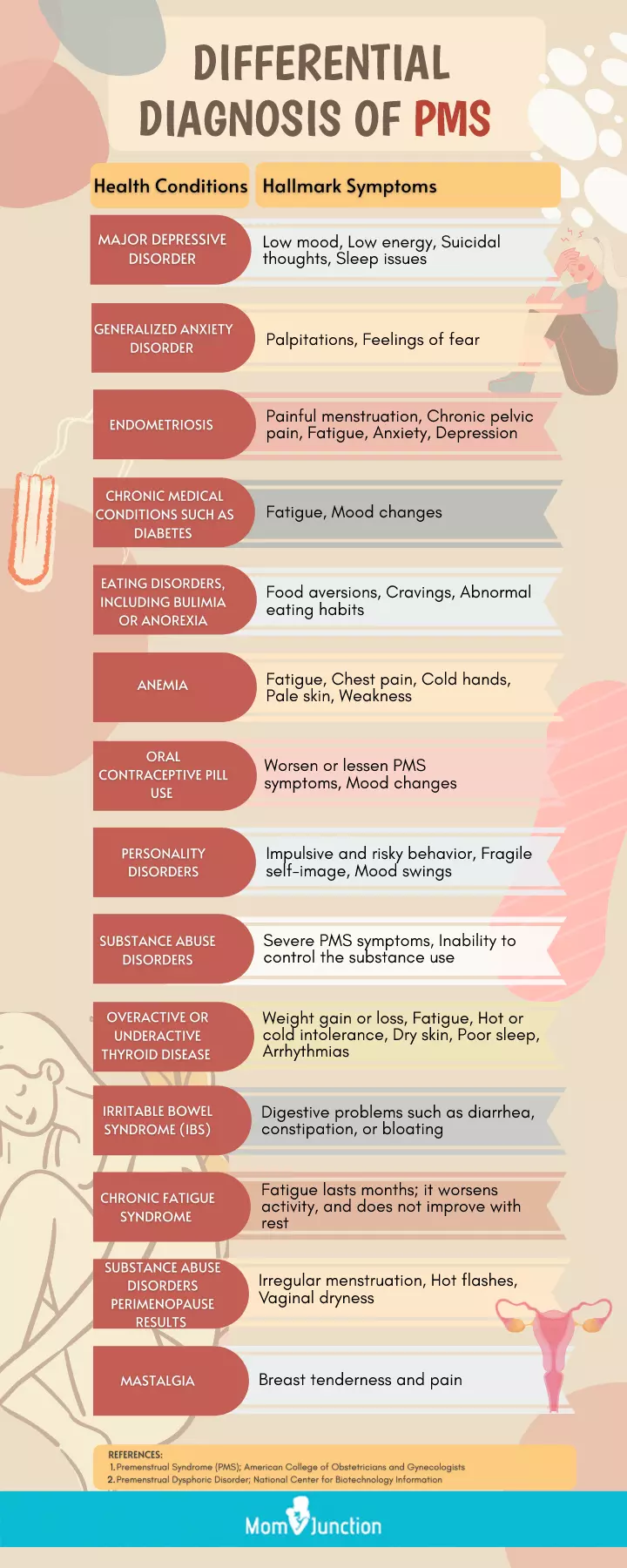
Illustration: PMS Vs. Pregnancy Symptoms: Differences And Similarities
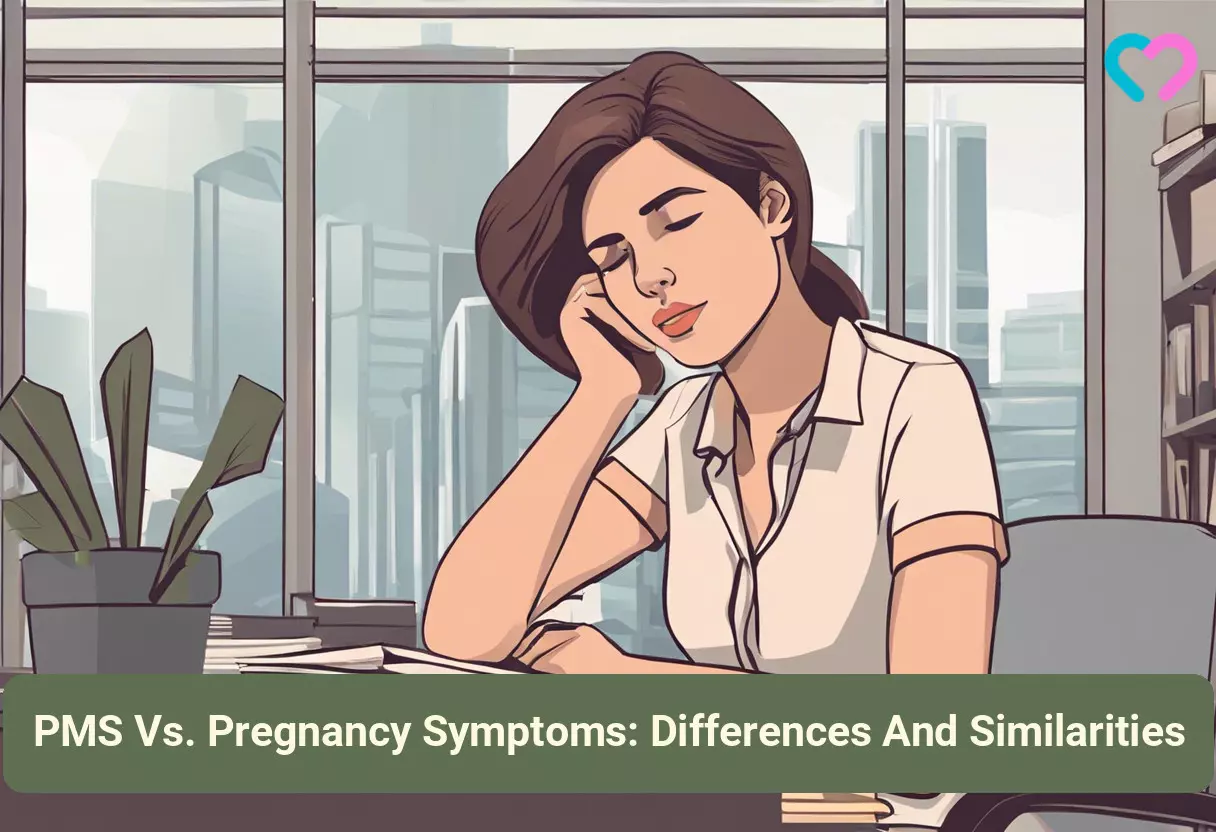
Image: Stable Diffusion/MomJunction Design Team
Personal Experience: Source
MomJunction articles include first-hand experiences to provide you with better insights through real-life narratives. Here are the sources of personal accounts referenced in this article.
i. My 1st Pregnancy Signs Before Missed Period vs Regular PMS Symptoms;https://www.youtube.com/watch?v=p3OSjW7saqY&feature=youtu.be
ii. “I couldn’t stop eating CLAY while pregnant, spent £3k on it and continue to eat it today” | SWNS
https://www.youtube.com/watch?v=liyr7q_R51Q&feature=youtu.be
References
1. Premenstrual syndrome (PMS); The Office on Women’s Health (OWH); The U.S. Department of Health and Human Services (DHHS)
2. Implantation Bleeding; Cleveland Clinic
3. Shazia Jehan, et al.;Sleep and Premenstrual Syndrome;NCBI
4. First Trimester Fatigue; University of Rochester Medical Center
5. Premenstrual syndrome; National Library of Medicine
6. Natalia C. Orloff and Julia M. Hormes;Pickles and ice cream! Food cravings in pregnancy:hypotheses, preliminary evidence, and directions for future research;National Library of Medicine
7. I Throw Up During My Period. Is That Normal?; Nemours KidsHealth
8. What are some common signs of pregnancy?; US Department of Health and Human Services
9. Dysmenorrhea (Menstrual Cramps); Cleveland Clinic
10. Dysmenorrhea: Painful Periods; American College of Obstetricians and Gynecologists (2015)
11. Aches and pains during pregnancy; U.S. Department of Health and Human Services National Institutes of Health (2012)
12. Signs and symptoms of pregnancy; NHS
13. Sun Min Lim, et al.;The Effect of the Menstrual Cycle on Inflammatory Bowel Disease; A Prospective Study
14. Premenstrual breast changes; National Library of Medicine
15. Genital and Reproductive Health; Princeton University.
16. Menstrually Related Mood Disorders; Center for Women’s Mood Disorders; The University of North Carolina School of Medicine
17. Markon, Kristian E., et al.Mood during pregnancy: Trends, structure, and invariance by gestational day; Journal of Psychiatric Research
18. Hidaka, Yui, et al.The Association between Premenstrual Syndrome Before Pregnancy and Antenatal Depression: A Cross-sectional Study with Prerecorded Information; Psychiatry and Clinical Neurosciences Reports
19. Earliest signs and early symptoms of pregnancy; Tommy
20. Vaginal discharge in pregnancy; NHS
21. Cardiac Signs and Symptoms During Pregnancy; Northwestern Medicine
22. Shortness of Breath In Pregnancy; Harvard Medical School
23. Kaitlyn Steward and Avais Raja; Physiology, Ovulation, Basal Body Temperature; StatPearls Publishing (2025)
24. Premenstrual syndrome; The United States National Library of Medicine
25. Reproductive health and mental health; US Department of Health and Human Services
26. Premenstrual syndrome: Treatment for PMS; Institute for Quality and Efficiency in Health Care (IQWiG); Cologne, Germany
27. Missed your period but not pregnant? 7 possible causes; UCLA Health
28. ACOG Releases New Guidelines on Management of Premenstrual Disorders; American College of Obstetricians and Gynecologists
29. Early Signs of Pregnancy; American Pregnancy Association
30. What is PMS (Premenstrual Syndrome)?; Planned Parenthood Federation of America Inc
31. Breast Pain: 10 Reasons Your Breasts May Hurt?; Johns Hopkins Medicine
32. Am I Pregnant?; Cleveland Clinic.
Community Experiences
Join the conversation and become a part of our nurturing community! Share your stories, experiences, and insights to connect with fellow parents.
Read full bio of Dr. Monica Agarwal
- Dr. Kirti Patel is an Ob/Gyn at UMass Memorial Healthcare and the chief medical officer of The POV, an online women's health resource. She did her MD from the University of Medicine and Dentistry of New Jersey -New Jersey Medical School and holds a master’s degree in Healthcare Leadership from Brown University.
 Dr. Kirti Patel is an Ob/Gyn at UMass Memorial Healthcare and the chief medical officer of The POV, an online women's health resource. She did her MD from the University of Medicine and Dentistry of New Jersey -New Jersey Medical School and holds a master’s degree in Healthcare Leadership from Brown University.
Dr. Kirti Patel is an Ob/Gyn at UMass Memorial Healthcare and the chief medical officer of The POV, an online women's health resource. She did her MD from the University of Medicine and Dentistry of New Jersey -New Jersey Medical School and holds a master’s degree in Healthcare Leadership from Brown University.
Read full bio of Rebecca Malachi
Read full bio of Dr. Ritika Shah
Read full bio of Reshmi Das







